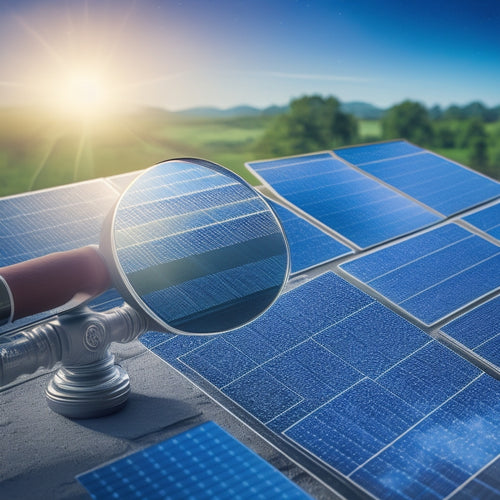
Installing Solar Power at Your Home
Share
You're considering installing solar power at your home, a great step towards renewable energy and cost savings. First, assess your home's solar potential by evaluating sunlight exposure, solar orientation, and shading. Choose the right solar panels based on efficiency, warranty, and aesthetic considerations. Understand the components of a solar power system, including inverters, mounting hardware, and monitoring systems. You'll need to decide on a system design option, such as grid-tied, off-grid, or hybrid, and select an installation method that suits your roof type. As you maneuver through these intricacies, you'll uncover more details that will help you make an informed decision.
Key Takeaways
- Assess your home's solar potential by evaluating sunlight exposure, solar orientation, and shading to determine the optimal panel placement.
- Choose the right solar panels based on factors like panel efficiency, warranty periods, aesthetic options, and brand reputation and certifications.
- Select a suitable system design option, such as grid-tied, off-grid, or hybrid, based on your energy consumption, budget, and available space.
- Consider installation and mounting options, including roof mounting systems and ground mounting, and choose the best fit for your roof type and energy needs.
- Research local incentives, such as tax credits and rebates, to understand the financial benefits of installing solar power at your home.
Assessing Your Home's Solar Potential
How much sunlight does your home receive? This is a critical question to answer when evaluating your home's solar potential. A thorough solar orientation analysis will determine the best placement of solar panels on your roof to maximize energy production.
A shading analysis will also identify any obstacles, such as trees or nearby buildings, that could reduce energy output.
Your home's energy efficiency will also impact the effectiveness of a solar power system. Conducting an energy audit can help identify areas for improvement, reducing your energy consumption and increasing the benefits of going solar.
Local incentives, such as tax credits or rebates, can also play a significant role in the financial considerations of installing solar power. Additionally, consider the environmental impact of reducing your reliance on fossil fuels and the community programs that may be available to support your decision.
Before installation, confirm you have the necessary installation permits and comply with utility regulations.
Choosing the Right Solar Panels
You'll likely need to select from a wide range of solar panels, each with its unique characteristics, advantages, and disadvantages.
When choosing the right solar panels for your home, consider panel efficiency, which affects how much power you'll generate per hour of sunlight. Look for panels with high efficiency ratings, typically above 20%.
Warranty considerations are also essential, as a longer warranty period can provide peace of mind and protect your investment. Compare costs among different brands and models, taking into consideration the upfront cost, expected lifespan, and potential energy savings.
Aesthetic options, such as panel color and frame type, can also influence your decision. Additionally, consider the environmental impact of the manufacturing process and the panel's recyclability.
Research the brand reputation, checking for certifications like ISO 9001 and IEC 61215. A reputable brand will offer high-quality products and reliable customer support.
Understanding Solar Power Systems
You'll need to understand the components that make up a solar panel system, including the panels themselves, an inverter, mounting hardware, and a monitoring system.
When designing your system, you'll have options to weigh, such as grid-tied, off-grid, or hybrid configurations, each with its own set of benefits and drawbacks.
Solar Panel Components
When considering a solar power system for your home, it's vital to understand the individual components that make up the system. The most important component is the solar panel, which converts sunlight into electrical energy.
There are various solar panel types, including monocrystalline, polycrystalline, and thin-film panels. Each type has its own efficiency rating, which affects how much power it can generate per hour of sunlight.
Solar panel efficiency is measured by its ability to convert sunlight into electrical energy. Higher efficiency panels produce more power per hour of sunlight, making them more suitable for homes with limited roof space.
For instance, a 300-watt solar panel with 20% efficiency will produce more power than a 300-watt panel with 15% efficiency.
Other necessary components include the mounting system, which secures the panels to your roof, and the inverter, which converts DC power from the panels to AC power for your home.
Understanding these components will help you make informed decisions when selecting a solar power system for your home.
System Design Options
Several system design options are available for homeowners looking to install a solar power system, each catering to specific needs and requirements.
You'll need to evaluate your energy consumption, budget, and available space when selecting a system design that suits you. Off-grid systems, for instance, are ideal for remote locations or those who want complete energy independence. These systems rely solely on solar power and often include energy storage solutions like batteries.
On the other hand, grid-tied systems are more common and allow you to sell excess energy back to the grid. Hybrid solutions offer a balance between the two, providing backup power during outages and grid connection during normal operation.
You'll also need to decide on the type of mounting system, whether it's a rooftop installation or a ground-mounted array. Additionally, you may want to assess monitoring and tracking systems to optimize your energy production and consumption.
Installation and Mounting Options
You'll need to decide how to install your solar panels, and you have two main options: roof mounting systems and ground mounting options.
Roof mounting systems attach directly to your roof, using a racking system to secure the solar panels.
Ground mounting options, on the other hand, involve installing the panels on a raised structure in your yard.
Roof Mounting Systems
The roof of your home provides the ideal canvas for utilizing solar energy, and a well-designed roof mounting system is crucial to guaranteeing a safe and efficient installation.
When it comes to roof mounting systems, you'll need to evaluate your roof type and cost considerations.
-
Asphalt Shingles: The most common roof type, asphalt shingles require a mounting system that securely fastens to the roof deck without damaging the shingles.
-
Metal Roofs: Metal roofs offer a more durable option, allowing for a more secure attachment of the mounting system.
-
Tile Roofs: Tile roofs require a specialized mounting system that won't damage the tiles or compromise the roof's integrity.
You'll also need to assess the type of roof mounting system, such as a railed or rail-less system.
Railed systems provide additional structural support, while rail-less systems are more cost-effective.
Regardless of the system you choose, verify it's designed to withstand local weather conditions and meets local building codes.
A well-designed roof mounting system will provide a secure and efficient installation, allowing you to tap into the full potential of solar energy.
Ground Mounting Options
As an alternative to roof mounting, ground mounting options provide a viable solution for homeowners who want to capture solar energy without compromising their roof's integrity. This approach allows you to install solar panels on the ground, freeing up your roof for other uses.
Ground mounting systems typically consist of a racking system, foundation, and tracking system.
When considering ground mounting options, you'll need to assess your site's suitability. Look for areas with minimal shading, stable soil, and proximity to your electrical infrastructure. Cost considerations are also significant, as ground mounting systems can be more expensive than roof-mounted systems.
However, they offer greater flexibility regarding panel orientation and angle, potentially leading to higher energy yields.
During site selection, consider the terrain, wind direction, and local building codes. Verify that your chosen site is accessible for maintenance and doesn't pose environmental hazards.
Inverters and Energy Storage
Your solar panel system's DC power output needs to be converted into AC power that's compatible with your home's electrical grid, and that's where inverters come in.
Inverters are an essential component of your solar panel system, as they enable you to feed excess energy back into the grid and offset your energy consumption.
There are several inverter types to choose from, including:
- String Inverters: Most common type, suitable for residential and commercial installations.
- Microinverters: Ideal for smaller systems or those with shading issues.
- Power Optimizers: Offer maximum flexibility and monitoring capabilities.
When it comes to energy storage, you'll need to take into account battery technologies that complement your inverter choice.
Popular options include lithium-ion, lead-acid, and flow batteries.
These batteries can store excess energy generated during the day for use during the night or during power outages.
Maintenance and Monitoring Needs
Optimizing your solar panel system's performance requires regular maintenance and monitoring. You'll need to guarantee that your system operates at its maximum capacity to generate the power you need.
Regular cleaning is essential to maintain your system's efficiency. Use gentle cleaning techniques to remove debris and dirt that can reduce energy production. You should also inspect your system regularly for signs of wear and tear, and address any issues promptly.
Performance tracking is vital to identify potential issues and optimize your system's performance. You can use monitoring software to track your system's energy production in real-time. This data will help you identify patterns and trends, and make adjustments to optimize your energy output.
Regular monitoring will also help you detect any potential issues, such as faulty inverters or damaged panels, and address them before they impact your energy production. By staying on top of maintenance and monitoring, you can guarantee that your solar panel system operates at its best, providing you with reliable and efficient power.
Frequently Asked Questions
Can I Install Solar Panels Myself to Save Money?
Like a skilled builder, you're tempted to construct your own solar empire, but beware: DIY installation may not yield the cost savings you expect, as improper setup can lead to reduced efficiency and even safety risks.
How Long Does a Typical Solar Panel Warranty Last?
You typically get a 25-year warranty on solar panels, covering defects and performance guarantees, which aligns with the average solar panel lifespan, ensuring you're protected and powered for a quarter century, with most manufacturers offering warranty coverage.
Are Solar Panels Resistant to Extreme Weather Conditions?
You'll be surprised to know that 90% of solar panels remain functional after 30 years. When it comes to extreme weather, you'll find that solar panels are built to last, boasting impressive durability and performance in harsh conditions, withstanding hail, high winds, and heavy snow loads.
Can I Sell Excess Energy Back to the Grid?
You can sell excess energy back to the grid through net metering benefits, where utilities credit you for surplus power, and energy buyback programs, which purchase excess energy from you, offsetting your consumption costs.
Do Solar Panels Require Regular Cleaning for Efficiency?
As you utilize the power of the sun, remember that dusty solar panels are like clogged arteries, stifling energy flow. Regular cleaning is vital; aim for a quarterly solar panel maintenance routine to guarantee maximum efficiency, lest you sacrifice up to 25% of your hard-won power.
Related Posts
-

Solar Panel System Certification Costs: A 10-Point Breakdown
You're looking to understand the costs associated with solar panel system certification. Your total certification cos...
-

Top 10 Tips for Buying Car Accessories Online
When purchasing car accessories online, you should take proactive steps to avoid low-quality or incompatible products...
-

Charging Station Incentives: Why So Many Are Free
You're likely to stumble upon free or low-cost charging stations due to a convergence of incentives. Government rebat...


